Victorian, Industrial, and World War History School Trip
Royal Gunpowder Mills
 Waltham Abbey EN9 1JY
Waltham Abbey EN9 1JY
 A history trip to The Royal Gunpowder Mills offers a fun, curriculum-linked learning experience that immerses students in the industrial, social, and wartime history of this fascinating former explosives factory. Designed with different key stages in mind, each topic combines interactive performances with costumed historical characters, hands-on activities like history trails, object handling, guided tours, and exhibition visits. Our immersive experiences go beyond the classroom—bringing the past vividly to life and helping students connect with history in exciting, memorable ways.
A history trip to The Royal Gunpowder Mills offers a fun, curriculum-linked learning experience that immerses students in the industrial, social, and wartime history of this fascinating former explosives factory. Designed with different key stages in mind, each topic combines interactive performances with costumed historical characters, hands-on activities like history trails, object handling, guided tours, and exhibition visits. Our immersive experiences go beyond the classroom—bringing the past vividly to life and helping students connect with history in exciting, memorable ways.About the Site
The Royal Gunpowder Mills is a unique 170-acre site in Waltham Abbey, Essex, with over 300 years of history at the heart of Britain’s military and industrial past. Established in the 17th century, it became a vital centre for gunpowder production and later for the development of explosives used in major conflicts, including both World Wars. During the Cold War, it operated as a top-secret government facility, contributing to cutting-edge military research. Today, its preserved buildings, wartime infrastructure, and hidden history offer students a powerful insight into Britain’s industrial heritage, wartime innovation, and the people who shaped it.
Topics
Victorians (KS1/2)
Step back into the reign of Queen Victoria and meet Henry Gaunt, a lively factory worker with plenty of stories to share! Discover what life was like for everyday people—at home, at school, and at work in a gunpowder factory. Through interactive storytelling, students learn about Victorian family life, education, and the risky business of making gunpowder (safely… most of the time!). Then, take part in a History Detectives Trail around the site, exploring original buildings and uncovering historic objects that bring the Victorian era to life. Students finish the day with a hands-on challenge to see if they have what it takes to be a real Victorian worker!
The Home Front (KS2)
Discover life on the Home Front during the Second World War at one of Britain’s most important wartime industrial sites. Students meet Leslie Gaunt, an ARP warden and factory worker, who shares powerful stories of daily life during the Blitz, air raids, rationing, and the vital role factories like The Royal Gunpowder Mills played in supporting the war effort.
Through interactive storytelling and discussion, pupils explore key wartime themes including civilian resilience, evacuation, and propaganda. In a hands-on object handling session, they’ll step into the shoes of wartime children—empathising with evacuees, experiencing what life was like during the Blitz, and understanding the fear caused by German bombing raids.
WWI: The Science of War (KS3/4)
Take your students on a cross-curricular journey exploring the intersection of industrial science and social history during the First World War. The day begins with a guided tour of our Grade I Listed Factory Building, led by a costumed munitions worker who shares firsthand insights into the life of women on the wartime production line. Students explore the science behind steam power, learning how thermal energy was converted into kinetic energy to drive the beam engines that powered the factory’s machinery.
In the afternoon, students board a tractor-trailer tour across our 170-acre site to investigate the industrial scale of wartime manufacturing. They’ll examine original, purpose-built structures for each stage of explosives production—connecting scientific processes like combustion, pressure, and energy transfer with real-world applications in wartime Britain. This experience deepens understanding of both the scientific principles behind industrial production and the social changes brought about by total war.
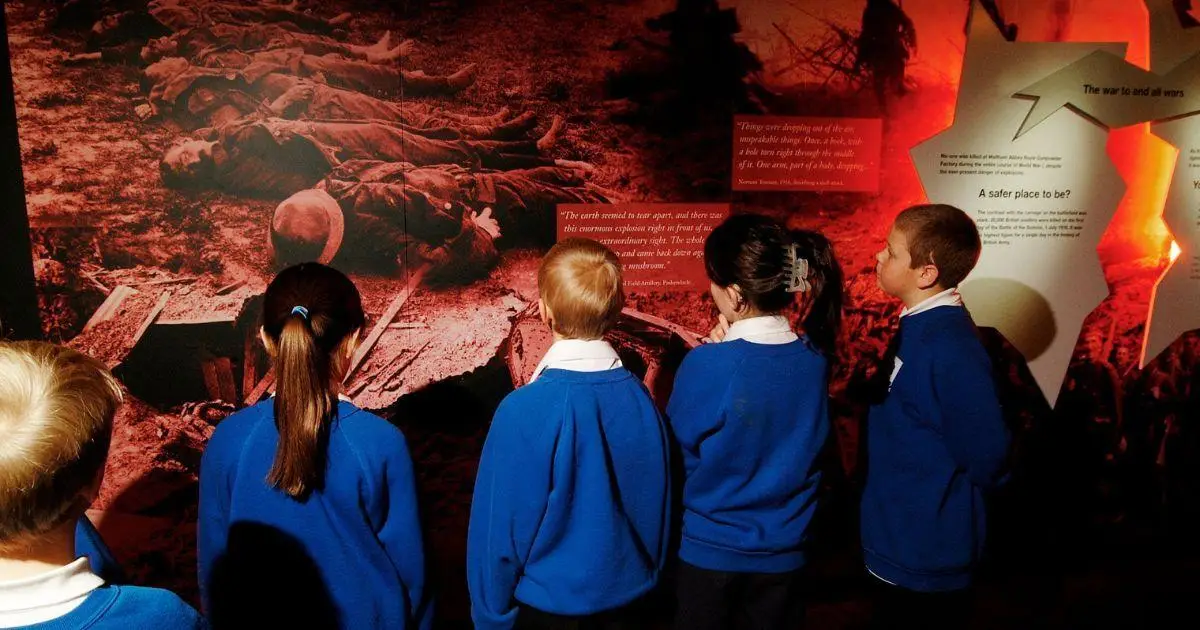
We can visit your school in: London & South East
What activities are available during educational visits?
Visits run from 10:30 AM – 2:00 PM
(Arrival from 10:00 AM | Departure by 2:30 PM)
Topics
Victorians (KS1/2)
Step back into the reign of Queen Victoria and meet Henry Gaunt, a lively factory worker with plenty of stories to share! Discover what life was like for everyday people—at home, at school, and at work in a gunpowder factory. Through interactive storytelling, students learn about Victorian family life, education, and the risky business of making gunpowder (safely… most of the time!). Then, take part in a History Detectives Trail around the site, exploring original buildings and uncovering historic objects that bring the Victorian era to life. Students finish the day with a hands-on challenge to see if they have what it takes to be a real Victorian worker!
The Home Front (KS2)
Discover life on the Home Front during the Second World War at one of Britain’s most important wartime industrial sites. Students meet Leslie Gaunt, an ARP warden and factory worker, who shares powerful stories of daily life during the Blitz, air raids, rationing, and the vital role factories like The Royal Gunpowder Mills played in supporting the war effort.
Through interactive storytelling and discussion, pupils explore key wartime themes including civilian resilience, evacuation, and propaganda. In a hands-on object handling session, they’ll step into the shoes of wartime children—empathising with evacuees, experiencing what life was like during the Blitz, and understanding the fear caused by German bombing raids.
WWI: The Science of War (KS3/4)
Take your students on a cross-curricular journey exploring the intersection of industrial science and social history during the First World War. The day begins with a guided tour of our Grade I Listed Factory Building, led by a costumed munitions worker who shares firsthand insights into the life of women on the wartime production line. Students explore the science behind steam power, learning how thermal energy was converted into kinetic energy to drive the beam engines that powered the factory’s machinery.
In the afternoon, students board a tractor-trailer tour across our 170-acre site to investigate the industrial scale of wartime manufacturing. They’ll examine original, purpose-built structures for each stage of explosives production—connecting scientific processes like combustion, pressure, and energy transfer with real-world applications in wartime Britain. This experience deepens understanding of both the scientific principles behind industrial production and the social changes brought about by total war.
Which curriculum topics do we cater for?
 Industrial School Trip
Industrial School Trip
Energy Technological Innovation Work and the Factory system Transportation Engineering
Students will explore a former explosives factory to gain insight into the daily lives of the men and women who worked there. They will learn about the challenges, dangers, and rewards of industrial labour during a time of rapid technological change. Through hands-on activities and historical interpretation, students will discover how innovations such as canals, steam power, and chemical inventions revolutionised production, improved efficiency, and transformed both the workplace and society.
 Victorian School Trip
Victorian School Trip
Factories and The Workhouse Railways Childhood and Schools Florence Nightingale Inventions Industrial Revolution
Click to read full text Students will explore a former gunpowder and explosives factory that was run by the Crown during the reign of Queen Victoria. As they step back in time, they’ll meet a costumed factory worker who will bring history to life, sharing what daily work was like in a dangerous and fast-changing industry. Through interactive activities and storytelling, students will discover what life was like for Victorian men, women, and children—both at work and at home. They’ll learn about the risks of handling explosives, the strict rules workers followed, and how new inventions began to change factory life. The visit also explores wider aspects of Victorian society, including health, housing, education, and how people spent their free time.
 World War School Trip
World War School Trip
War and the British Empire Technological developments War Propaganda Women in wartime Air Raids Blitz and Battle of Britain The Home Front Rationing Evacuation Drills and Marches World War II World War I
Students will explore a former explosives factory to learn about the lives of workers and the evolution of industrial jobs during times of peace and war. They will examine the risks and rewards of working with explosives, how technological advances like canals, steam power, and dynamite transformed production, and how the factory adapted during the World Wars. Through hands-on activities and costumed interpretation, students will discover how global conflict, innovation, and industrialisation shaped both the workplace and society.
 Inventors and Inventions School Trip
Inventors and Inventions School Trip
Students will learn how inventors like John Smeaton, James Watt, and Alfred Nobel helped change the explosives industry. Smeaton’s canals made it easier to move materials, Watt’s steam engine helped factories work faster, and Nobel’s dynamite made blasting safer and more powerful. These inventions helped factories grow, made work more efficient, and changed how people lived and worked during the Victorian era.
What size groups do we cater for?
On-site classroom facilities?
Is there first aid on site?
Access for visitors with disabilities
Visitors with Special Educational Needs (SEN)
When booking your trip with us, you will have a discussion with our Learning and Outreach Officer about the needs of your group and how Royal Gunpowder Mills can best adapt our sessions.
Who are Royal Gunpowder Mills?
Royal Gunpowder Mills is a charitable organization dedicated to preserving, protecting, and sharing the rich history and natural heritage of 175 acres of historic buildings, wildlife, and archaeological sites. Situated in Waltham Abbey, Essex, we are home to 21 listed buildings and much of the site is designated as a Scheduled Monument and Site of Special Scientific Interest (SSSI).
Schools and education groups have been visiting our site for over 20 years and those who know about us visit every year. Check out these testimonials from one of our recent trips:
'One of the best trips I've done with a class. Superb talk and workshop with Isabella and the team. Our students loved it!'
'Attended as part of a school trip / had never heard of it before. We had Izzy and Colin deliver two different inputs to the children, Izzy’s was very interactive - they could handle exhibits and learn about what it must have been like for children being evacuated during the war. There was lots of opportunity for them to ask and answer questions and they really enjoyed trying the old stirrup pump! Colin delivered a talk posing as a WWI ARP and I have to say he was AMAZING! He had us all totally enthralled and entertained with his passionate talk on the history of the site. His talk was the perfect balance of science, history and even Panto- esque humour! The museum was fantastic, lots of interactive exhibits, the play area is great, I will definitely be back with the family!'

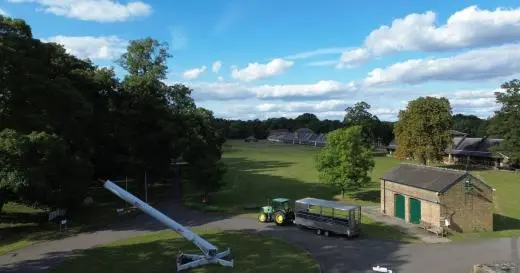
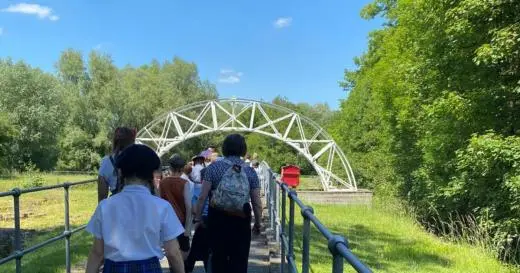

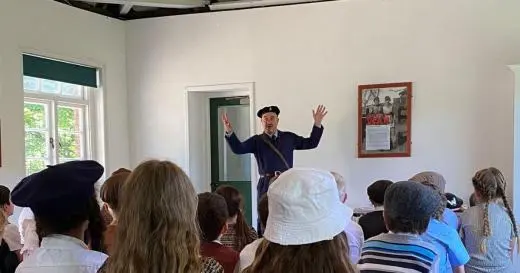
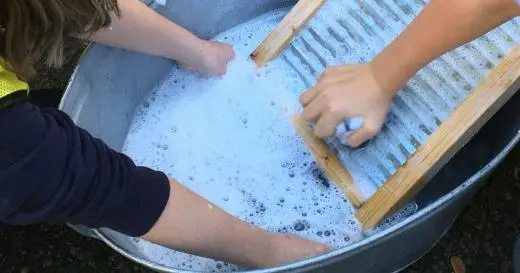
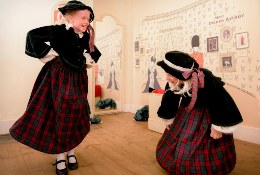

 Subscribe
Subscribe